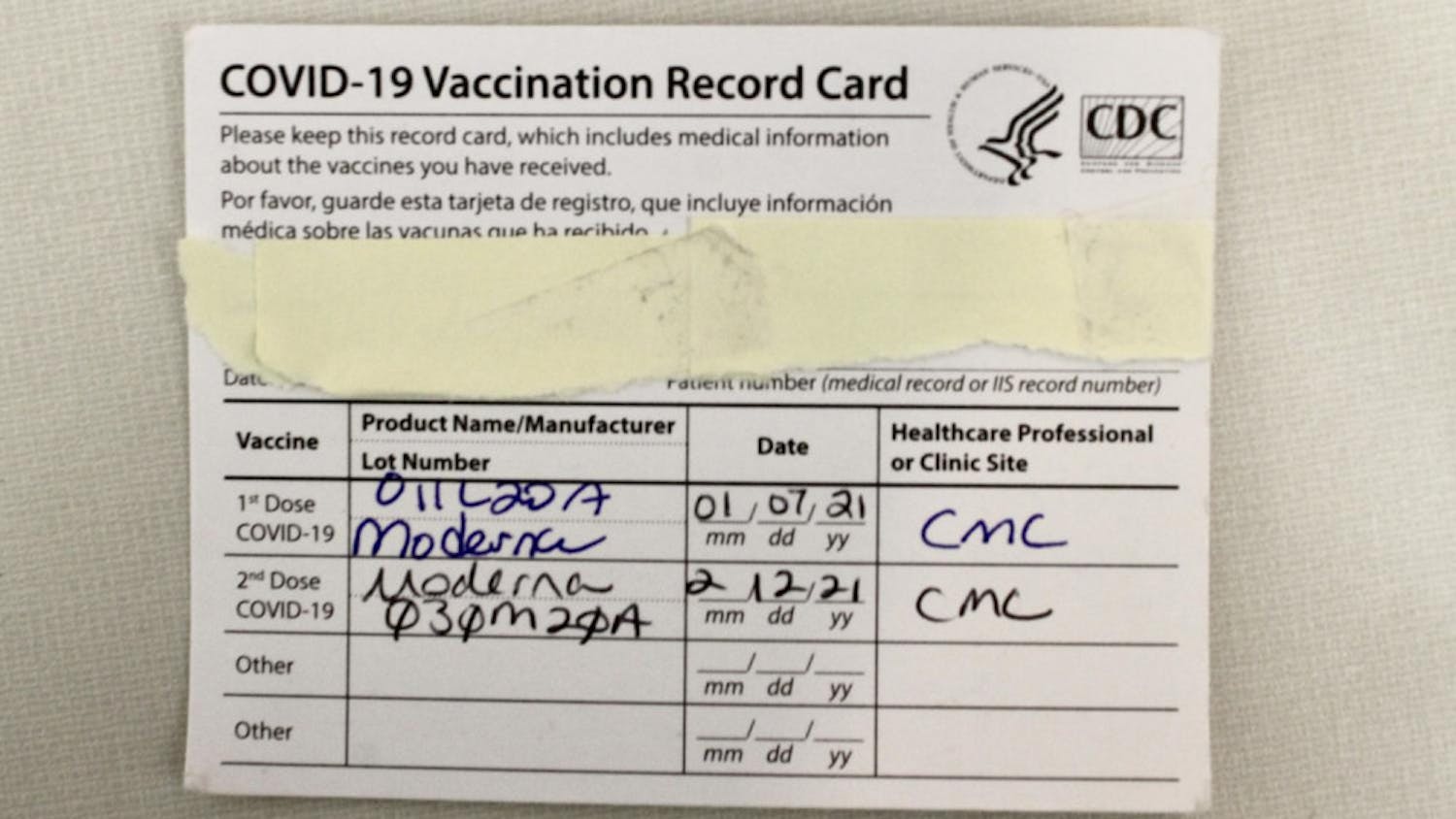Beta Upsilon Chi, a Christian men's social fraternity, established a colony at Mercer University this week after a months-long process and controversy among the community. Their entrance comes amidst debate across campus about the organization's history and religious ideals.
The fraternity, also known as BYX or "Brothers Under Christ," is "a lifelong brotherhood of committed Christian men seeking the bonds of brotherhood and unity in Christ through the avenue of social fraternity on a college campus," according to the organization's website.
"It was the vision of the founding fathers to have a fraternity of committed Christian men, based on the unique brotherhood that a Christian atmosphere affords, for the purpose of fellowship and glorification of Jesus Christ," the website states about BYX's founding in 1985.
Mercer Founding
Junior George Wall, president of Mercer's BYX colony, said he first learned of the fraternity when his friends at the University of Georgia went to a campus party that was hosted by BYX.
"We realized that there were a lot of men at Mercer that chose not to rush, especially in religious life," Wall said in an email. "By our estimates, there are 150 plus men that are active weekly in campus ministries, with a vast majority of those men not in a fraternity."
Sororities and fraternities that seek to become chapters on a college campus go through a variety of processes that vary among each organization. Many of these organizations go through a provisionary period where they are referred to as a "colony" for a specified period of time, after which they are permitted to become a "chapter."
The organization's founding members have taken multiple avenues to become recognized as a chapter on campus, first through Fraternity and Sorority Programs (FSP) and then through Religious Life.
To become an FSP organization at Mercer, there are several requirements outlined, including but not limited to having a minimum of seven full-time students who are interested, a timeline of expansion plans and support from the existing FSP community.
According to leaders within FSP organizations, BYX failed to receive that support.
Transition from FSP to Religious Life
The decision ultimately comes down to Mercer's Dean of Students, Dean Pearson. BYX was deemed a Religious Life organization, not an FSP fraternity.
"Since they are a hybrid, a Christian fraternity, they could have fallen under Greek Life or Religious Life," University Minister Craig McMahan said in an email. "In conversations with Dr. Pearson and his team, we decided to bring BYX in through Religious Life on a probationary basis to ensure that it is a good and appropriate fit."
Wall says the shift to Religious Life was not due to the lack of support, but instead because the process of becoming an FSP organization was taking too long.
"(FSP is) in the process of revising their admission policies for Greek Life and that process is not complete," McMahan said.
The FSP Policies state that they are "currently reviewing and updating all expansion policies," and that expansion requests are currently being put on hold.
"The most difficult part of the whole process was keeping interest together because it took over 16 months to navigate and complete everything required," Wall said. "However, from the moment we decided to pursue this dream, to the months of uncertainty, to the last several weeks of planning and preparation, the Lord has provided every step of the way."
BYX is joining organizations such as Reformed University Fellowship (RUF), Wesley of Macon, Baptist Collegiate Ministries (BCM) and Delight Campus Ministry.
"We are very excited to be in Religious Life alongside campus ministries; we have a lot of cross-organizational involvement and know that we will partner well with them," Wall said. He also said that he hopes BYX can partner with sororities and fraternities on campus.
Community Criticism
BYX has received criticism from the Mercer community since their initial presentation to Greek Life.
"I think they shouldn’t be here. White Christian men have enough safe spaces on this campus, they don’t need another one," Dakota Martinez, a member of Sigma Sigma Rho, said. Her sorority is among the FSP organizations that voted against BYX receiving a charter.
"I also think it’s really sketchy on BYX’s part to give campus life the go around and register under religious life when most if not all of their members are already in RUF and Wesley," Martinez said. "To me, it feels like they’re trying to gatekeep a religious organization which is against what the religious organizations on campus stand for."
Some members of the Mercer community have also noted that the fraternity has a history of being "openly homophobic" on the campuses in which it resides.
An example of this conduct was reported in the University of North Carolina Chapel Hill's Daily Tar Heel. A founding member of the fraternity on UNC's campus who was gay realized during his initiation that members of BYX were expected to be heterosexual.
"The organizational position of BYX is that we believe sex is a gift of God to be enjoyed only inside the covenant of marriage between a man and a woman. Therefore, we forbid such activity as fornication, adultery, and homosexual conduct. {I Corinthians 6:15-20; Hebrews 13:4},” stated the Honor Code of the organization’s agreement from 2014, The Daily Tar Heel reports.
Back in 2010, The Vanderbilt Hustler reported that two members of BYX were "asked to leave the fraternity in recent months due to violations of the organization’s policy pertaining to sexual orientation."
Wall says the BYX Honor Code was revised "years ago." The current Honor Code contains no language forbidding homosexual activity and states, "The organizational position of BYX is that sex is a great gift of God to be enjoyed only inside God’s established covenant of marriage. Therefore, we do not condone sexual immorality in the lives of our members."
Wall did not specify to The Cluster if BYX at Mercer would condone members identifying as LGBTQ.
"Our hope is that, as a fraternity, we will positively impact all individuals at Mercer," he said when asked about BYX's history regarding LGBTQ members. "We intend to carry on our National Organization’s commitment to lead a culture of kindness. As said before, we love this school, the people in it, and are excited to continue championing the ideals of brotherhood and unity."
Mercer's student organization policies require most organizations to follow both Title IX provisions and the university's nondiscrimination policy. The university’s Policy of Nondiscrimination states: "Mercer University does not discriminate on the basis of age, race, color, national or ethnic origin, sex or handicap in the administration of education policies, admission policies, financial aid, employment of any other University program or activity.”
According to The U.S. Department of Justice, "on the basis of sex" includes discrimination against gender identity and sexual orientation. This specification means that BYX — nor any other student organization on campus — would not be allowed to openly discriminate against LGBTQ students or deny membership based on that factor.
Looking Ahead
BYX has begun the process of becoming official on Mercer's campus. Starting this semester, they begin their year-long provisionary period as a colony, during which they must meet certain criteria. After this period, they can apply for their charter to become a chapter.
The fraternity's founding members include 23 men, who were initiated into the fraternity Friday. In spring 2021, the average number of total initiated members in IFC fraternities was 30.
"Truly, the guys are all eager to be a deeper part of campus and contribute to all facets of it," Wall said.
Just like other fraternities, BYX will hold fall and spring recruitment starting the fall 2022 semester.
"Since we founded this semester, we will not have recruitment until the fall," Wall said. "However, we are excited to engage campus, build relationships, and begin this exciting journey as a fraternity at Mercer."
Editor's Note: Mary Helene Hall is a member of Alpha Gamma Delta at Mercer University. The editors of this article are unaffiliated with Greek Life.
Mary Helene Hall ‘23 is a journalism and women’s and gender studies student who has worked for The Cluster throughout her time at Mercer. She has held internships at The Atlanta Journal-Constitution and AL.com, where she covered a variety of topics including politics, crime and culture.





